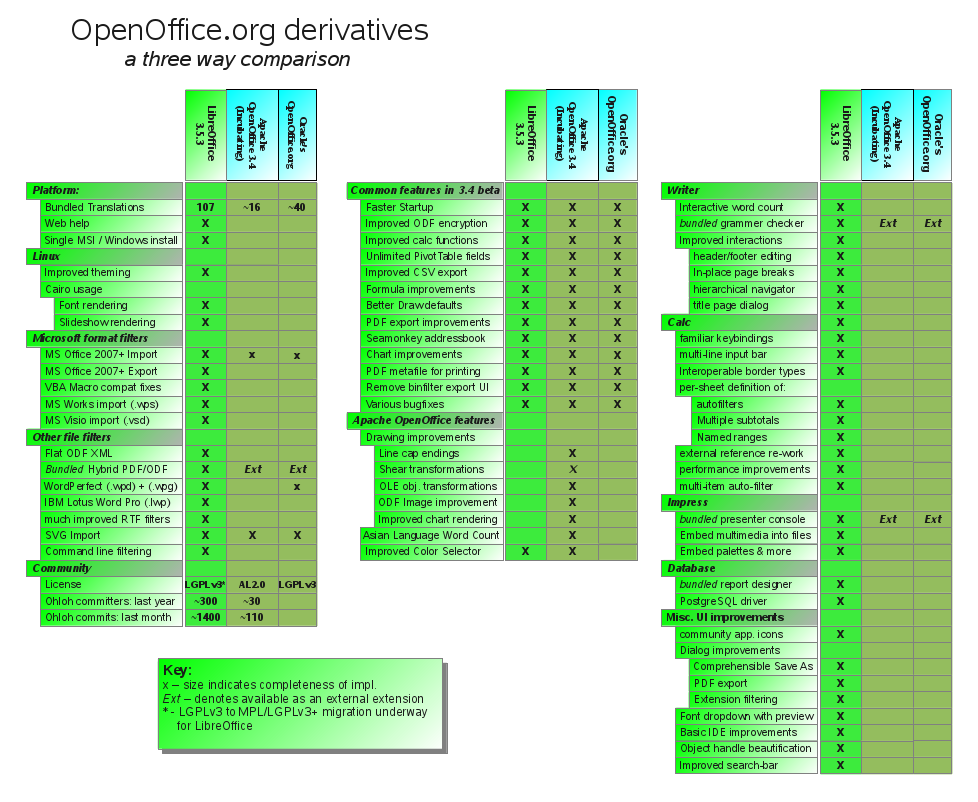Status update on LibreOffice / Apache OpenOffice
Michael Meeks has posted a status update on LibreOffice versus Apache OpenOffice. It is worth reading, but there are some points I’d like to add and emphasize.
The first is that the Apache OpenOffice project went public about a year ago. And in the meanwhile, all they’ve done is make a build with a small amount of new features:
Most of the new features they will announce are features done by Sun / Oracle, but never debugged / shipped. Only a handful of features have been achieved by this new organization. In other words, while Apache are now making a release under the OpenOffice brand, it is not a version moves things forward very much. It should be a concern that the value of the OpenOffice name is decreasing. How many would still be running Firefox if it didn’t make major improvements for 2 years? What is the point of a brand if you aren’t building the best product to represent it? It is cheapest if the brand is handed over to LibreOffice, though primarily IBM stands in the way. In the meanwhile, explaining to as many people as possible that LibreOffice is a better OpenOffice is helpful. I am happy several people mentioned LibreOffice in my movie interviews.
The Apache incubation started because IBM didn’t understand that LibreOffice had just build everything they would need and that copyleft is considered a good thing by many. IBM are convincing a few handfuls of naive contributors to use lax license with a primary benefit that allows IBM to use but not give back. I don’t recommend these people play poker.
The biggest point from that chart is that it documents how Apache OpenOffice is behind and will never be able to catch up with LibreOffice, especially considering their license prevents them from incorporating LO code. It should have been possible to predict these results a year ago, and now we have the evidence. I don’t expect these facts to make it into the skulls of smart but stubborn people at IBM, but it is a good reminder of the situation. There will surely be some announcements of their first release coming soon, and which will ask the community to try it out and help. Fortunately, the Linux community is already clued in to what is going on. LibreOffice is one of the most important communities to enable more people to run Linux on a full-time basis. There are many ways for people to help out.
Milton Friedman quotes
Here are some great quotes by Milton Friedman which describe some of the biggest problems in modern society.
The greatest advances of civilization, whether in architecture or painting, in science and literature, in industry or agriculture, have never come from centralized government.
The most important single central fact about a free market is that no exchange takes place unless both parties benefit.
The only way that has ever been discovered to have a lot of people cooperate together voluntarily is through the free market. And that’s why it’s so essential to preserving individual freedom.
If you put the federal government in charge of the Sahara Desert, in 5 years there’d be a shortage of sand.
Is it really true that political self-interest is nobler somehow than economic self-interest?
Many people want the government to protect the consumer. A much more urgent problem is to protect the consumer from the government.
Most economic fallacies derive from the tendency to assume that there is a fixed pie, that one party can gain only at the expense of another.
So that the record of history is absolutely crystal clear. That there is no alternative way, so far discovered, of improving the lot of the ordinary people that can hold a candle to the productive activities that are unleashed by a free enterprise system.
The black market was a way of getting around government controls. It was a way of enabling the free market to work. It was a way of opening up, enabling people.
The Great Depression, like most other periods of severe unemployment, was produced by government mismanagement rather than by any inherent instability of the private economy.
Protests in the UK
I think of my friends in the UK.
Many Americans feel their country is crumbling too. There have been demonstrations in the US against the current government for 2 years now. They are known as the tea party. They protest for economic improvement like people are demanding in your country.
The official storyline in the US is that the tea party protesters are: “racist, uncompromising, potentially violent, and stupid”. The movement is mentioned regularly in the US news, and on comedy shows, and it is almost exclusively in a negative light. (Here is one example.) This is in spite of the fact that they have not flipped over even one car yet. This is done mostly to slow the growth of the movement, and it has had great success. Almost everyone who has not seen or been to a tea party rally are fully convinced they are diabolical.
The good news is that the solution to economic stagnation in our countries is simple: we need to unwind the bankrupt welfare state.
Maybe you could create a tea party in the UK? We’ll combine efforts! We can send you Sarah Palin and you send us Daniel Hannan.
Another huge problem is single motherhood. Incidence of this in the UK is the highest in Europe. Single-motherhood is a consequence of the welfare state. The social and economic are thoroughly mixed!
Open letter to Apache regarding OpenOffice / LibreOffice
Open letter to an Apache mailing list regarding their OpenOffice incubation plan. This was originally written in June 2011, so is out of date but much still applies.
Having written code in Microsoft Office, why this Apache fork is bad is intuitively obvious to me. I wish everyone had the same instincts. In the days since I first saw the announcements, I’ve been reading and learning a number of additional facts that helped me understand all the reasons why for this situation.
Here I will summarize the “no” vote reasons against this Apache incubation proposal. While reading, I gained respect for the Apache foundation and the OpenOffice brand. There is love people attach to these names. Apache could offer poop on a stick and it would have downloads and people curious about how to make it better.
Many of us want all of these good ideas and energies to be channeled. The LibreOffice team is not a raging success yet and they’ve just climbed some big hills. Yet no one inside is complaining of a reason to fork.
Given all I have read, this is my (unfinished) list for the arguments against:
——-
- This is mostly a code dump, not the set of 50(?) full-time engineers who have created / been maintaining this code.
- This technology is massive. It is about the same size as the Linux kernel (10 million lines). This is a world that thousands could get lost in. Because the codebase is so large, it makes the cost of the fork that much greater.
- IBM’s priority will be on Symphony and Notes (which build on top) more than the core code.
- Much of the expertise is at Sun / Oracle, and IBM is not bringing many of them over.
- IBM’s biggest investment here is “open source” evangelists. They believe the community will build everything for them.
- This is mostly a cabal of IBM / Sun evangelists trying to confuse Apache into letting them fork the LibreOffice community.
- The Apache foundation has a lot of experience, but none with this technology. Therefore, their help will be limited. It is like asking a hospital to fix your car.
- The Apache foundation requires developers use SVN, which is not as good as Git for handling a large distributed project.
- The code dump is missing a lot (filters, images, translations, etc.)
- OpenOffice is now primarily a brand to be preserved.
- This brand is in jeopardy now.
- There is nothing to incubate. LibreOffice has just built everything you need.
- The Apache License (AL2) is not within the spirit of the tradition of this codebase.
- There is no company waiting to build some amazing technology like Watson in LibreOffice but hold back because of its “restrictive” license. These are just fantasies IBM can promise and a rhetorical trick because anything about the future is impossible to disprove.
- A proprietary Watson could be built on LO today. LGPL is the ideal license for this codebase, a compromise between GPL and Apache. LibreOffice should not compromise anymore.
- This proposal is considered to have a practical license agreement, but grabbing code changes from LibreOffice is said to be impractical. This is not considered a problem.
- Linus said that making Linux the GPL was the “best thing he ever did.”
- Copyleft is compelling to small LibreOffice contributors. “Do you really want to write Apache 2 (AL2) so that IBM can make it proprietary and sell it?”
- The move from Java towards Python in LO will add more barriers.
- There is a lot to be done: polish, services, plugins, mobile, etc. We don’t have people to waste.
- LO has just recruited many of the most passionate and experienced volunteers and other unaffiliated third-parties.
- People will show up here because of the Apache, OpenOffice, and IBM name. They will not understand what is going on.
- There were 87 contributors who signed on to this proposal, but many are just curious.
- The leaders create bad plans, find curious and naive people who “support” it, and use those numbers as proof that their plan has merit and should go forward.
- The community of contributors to this podling is artificially inflated with “advocates” and not many people with expertise in the OO codebase.
- Microsoft would root for Apache to fork the LibreOffice community.
- LibreOffice is a young community, so some are easily confused and frightened. Many barely know this name “LibreOffice”. Meanwhile LO needs and would love to have more people.
- The OO brand was given up by Oracle primarily because of the success of LibreOffice.
- The OpenOffice brand would be very valuable to LO today.
- These “open source” evangelists from IBM, Sun, etc. should hand over the OpenOffice trademark before they hurt someone. LibreOffice can maximize the value and carry it on best right now.
- They need all kinds of help. They are not turning down one contribution, and no one inside is threatening to fork because of problems.
- The hardware / bandwidth costs are not very expensive. It is the human costs.
- It is not just a question of if you fail, but what is the damage in that failed experiment.
- There is also the opportunity cost of doing something better than failure.
- Rather than using resources to help LibreOffice, they are used to hurt them, and waste their own life rebuilding what LibreOffice has just finished.
- If this podling fails, it could hurt the value of the OpenOffice brand, LibreOffice, waste resources (these emails are just the start), hurt Apache’s reputation, etc.
- Forks are one of the biggest reasons why free software has struggled in places. For an example in another industry, look at Blu-Ray vs. HD-DVD.
- People at IBM responsible for Notes / Symphony may get bad reviews for building on top of a dying fork and when internal customers complain the product isn’t as good as what comes with Linux. These “open source” evangelists are supposed to have their finger on the pulse of the community, not their finger in the face of the community. I stole that from someone 😉
- No major revisions have been proposed.
- A “no” vote on current idea is fail-fast and the potential for a better plan.
- LO see this as a danger. They received more cash donations since this announcement.
- It will only be a trickle of volunteers. If more show up, LibreOffice can recruit in bulk.
- With the interested people already occupied, this will never catch up with LibreOffice.
- Wise people I have consulted with in LibreOffice believe this will fail.
- Some are not even worried anymore, but I am less confident.
- Some believe the Apache foundation is being used to legitimize a premature idea.
- I believe the result will be the same no matter the vote unless the plan is changed. This plan is like an animal chewing off its own paw even though it wasn’t stuck in a trap.
- Once you have written failure into your plans, like to build a house out of sand instead of concrete, these “friendly” meetings to resolve differences cannot achieve much.
- May, 2012: IBM has made their proprietary Symphony code available for free. Initially, many thought that the primary reason IBM wanted this project in the Apache foundations was because because they wanted to build a proprietary Symphony on top, and only the lax Apache license allowed for this. So now that the their proprietary code is free, even this reason disappears.
———
I am an un-affiliated observer rooting for Linux on the desktop and Python over Java. I have spent years surveying and writing about Linux so I’ve come to respect the Apache server very much. Any rude bits in my mails were directed at IBM 😉 I believe they should know better than to attempt to fork a community. I think the Apache foundation has been caught in the cross-fire of the language and license battles. I feel sorry for these political battles. There are also actual proprietary competitors to fight as well! Isn’t that the most important?
Even if this is born, and fails, the community will pick up the pieces. It has many times before. The LO opinion of the plan is close to unanimous and strongly-felt. My feelings are more mixed.
Perhaps this can help serve as impetus for the vote. Many are curious to its result and are anxiously awaiting.
Hope this work is helpful.
Warm regards,
-Keith
Update: June 13: The podling was created. Oh well, Rome wasn’t built in a day. It is tragic that they’ve designed failure into their plans. Not only that, the opportunity cost of combining resources immediately. Reading their plan, some sentences are reasonable, and some stand out like daggers.
A better plan would have helped instead of hurt. These emails were a huge waste of time, and just the start. Many “open source” evangelists are actually hindrances. Some think forks are okay because they’ve happened before. This is like advocating for slavery because slavery has happened before.
The worst part is that the supporters of this plan made no changes to address the major flaws found by the community since the proposal was first announced. It is rude not to retract and make a new plan when relevant people have big objections to your idea. If you want to get code into the Linux kernel, you need to fix all the problems people find. Plans can be refined and improved, but this did not happen. The cost of the flaws only gets more expensive as this goes forward. Therefore, it was cheapest to vote this down now, so we can make a new plan. The new plan would involve something like making LibreOffice and its license the mainline, and merging TDF and Apache. Who knows where it goes from here.
Another Post to the LKML
Post is here.
Start:
I wrote two responses, which eventually allowed me to boil it down to one sentence: You can do anything you want in addition to perfection (i.e. zero bugs). Long answer: I was baptized into the zero bugs religion about 20 years ago. This was before the web and time-based releases, but these only add complications, and are yet compatible with zero bugs all the time. As a beginner, you can cheat such as zero bugs older than 6 months / 2 releases, or give yourself 1,000. Over time, you can pick new goals and improve your numbers. Reaching enlightenment may require multiple steps. You don't have to meet your goals, but you will become better for trying.




